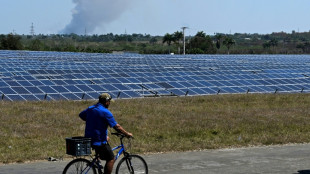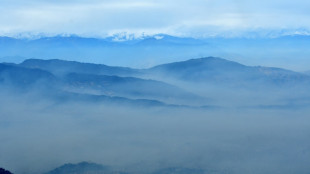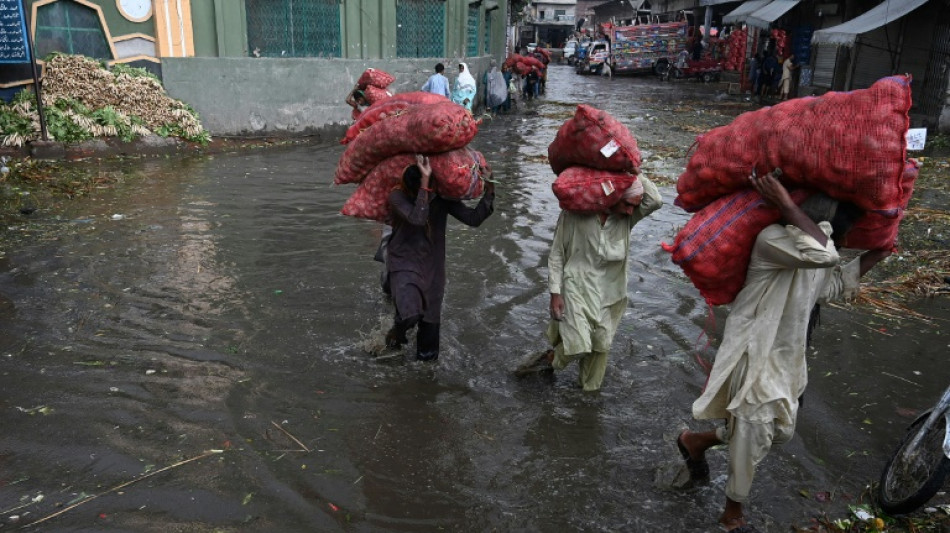
-
 De Bruyne to leave Man City at end of the season
De Bruyne to leave Man City at end of the season
-
Youthful Matildas provide spark in friendly win over South Korea

-
 Stocks, oil extend rout as China retaliates over Trump tariffs
Stocks, oil extend rout as China retaliates over Trump tariffs
-
De Bruyne says he will leave Man City at end of season

-
 UK spy agency MI5 reveals fruity secrets in new show
UK spy agency MI5 reveals fruity secrets in new show
-
Leverkusen's Wirtz to return 'next week', says Alonso

-
 England bowler Stone to miss most of India Test series
England bowler Stone to miss most of India Test series
-
Taiwan earmarks $2.7 bn to help industries hit by US tariffs
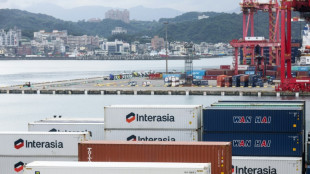
-
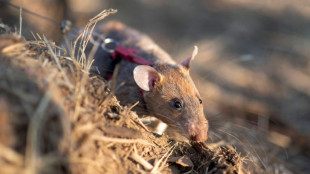 Rat earns world record for sniffing landmines in Cambodia
Rat earns world record for sniffing landmines in Cambodia
-
Elton John says new album 'freshest' since 1970s

-
 EU announces 'new era' in relations with Central Asia
EU announces 'new era' in relations with Central Asia
-
Greece nixes Acropolis shoot for 'Poor Things' director

-
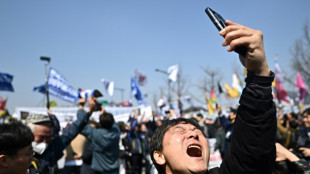 'Historic moment': South Koreans react to Yoon's dismissal
'Historic moment': South Koreans react to Yoon's dismissal
-
Israel kills Hamas commander in Lebanon strike

-
 Trump unveils first $5 million 'gold card' visa
Trump unveils first $5 million 'gold card' visa
-
Crashes, fires as Piastri fastest in chaotic second Japan GP practice

-
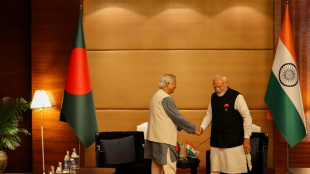 India and Bangladesh leaders meet for first time since revolution
India and Bangladesh leaders meet for first time since revolution
-
Israel expands ground offensive in Gaza
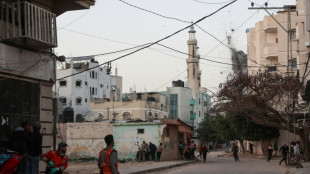
-
 Families of Duterte drug war victims demand probe into online threats
Families of Duterte drug war victims demand probe into online threats
-
Stocks extend global rout after Trump's shock tariff blitz

-
 Kolkata's Iyer more bothered about impact than price tag
Kolkata's Iyer more bothered about impact than price tag
-
BP chairman to step down after energy strategy reset

-
 Indian patriotic movie 'icon' Manoj Kumar dies aged 87
Indian patriotic movie 'icon' Manoj Kumar dies aged 87
-
China floats battle barges in Taiwan invasion plans
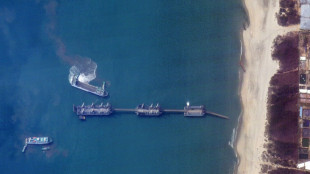
-
 McLaren's Piastri fastest in chaotic second Japanese GP practice
McLaren's Piastri fastest in chaotic second Japanese GP practice
-
South Korea seize two tons of cocaine in largest-ever drug bust
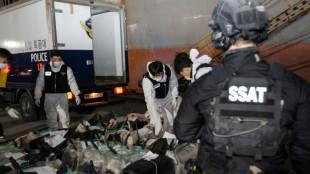
-
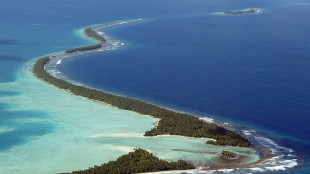 Pacific nations perplexed, worried by Trump tariffs
Pacific nations perplexed, worried by Trump tariffs
-
The race to save the Amazon's bushy-bearded monkeys

-
 TikTok must find non-Chinese owner by Saturday to avert US ban
TikTok must find non-Chinese owner by Saturday to avert US ban
-
Trump tariffs to test resiliency of US consumers

-
 Clamping down on 'forever chemicals'
Clamping down on 'forever chemicals'
-
Prominent US academic facing royal insult charge in Thailand

-
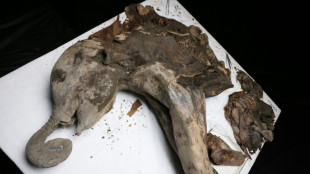 Yana, a 130,000-year-old baby mammoth, goes under the scalpel
Yana, a 130,000-year-old baby mammoth, goes under the scalpel
-
'Don't want to die': Lesotho HIV patients look to traditional medicine

-
 Curry scores 37 as Warriors outgun LeBron's Lakers
Curry scores 37 as Warriors outgun LeBron's Lakers
-
Crops under threat as surprise March heatwave hits Central Asia: study

-
 Japan PM says Trump tariffs a 'national crisis'
Japan PM says Trump tariffs a 'national crisis'
-
Security 'breakdown' allows armed men into Melbourne's MCG

-
 Norris fastest in Japan GP first practice, Tsunoda sixth on Red Bull debut
Norris fastest in Japan GP first practice, Tsunoda sixth on Red Bull debut
-
Albon says Thailand taking bid for F1 race 'very seriously'

-
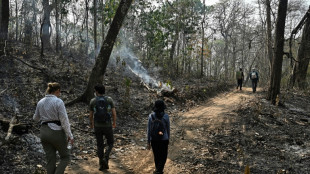 'It's gone': conservation science in Thailand's burning forest
'It's gone': conservation science in Thailand's burning forest
-
Protest as quake-hit Myanmar junta chief joins Bangkok summit
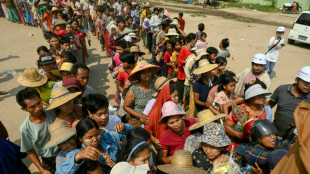
-
 EU leaders push for influence at Central Asia summit
EU leaders push for influence at Central Asia summit
-
Asian stocks extend global rout after Trump's shock tariff blitz

-
 Lewandowski, Mbappe duel fuelling tight La Liga title race
Lewandowski, Mbappe duel fuelling tight La Liga title race
-
South Korea court upholds President Yoon's impeachment, strips him of office

-
 Liverpool march towards title as Man City face Man Utd
Liverpool march towards title as Man City face Man Utd
-
Finland's colossal bomb shelters a model for jittery Europe

-
 Athletes frustrated as France mulls Muslim headscarf ban in sport
Athletes frustrated as France mulls Muslim headscarf ban in sport
-
Korda downs Kupcho to stay alive at LPGA Match Play


'Third' of Pakistan under water as flood aid efforts gather pace
Aid efforts ramped up across flooded Pakistan on Tuesday to help tens of millions of people affected by relentless monsoon rains that have submerged a third of the country and claimed more than 1,100 lives.
The rains that began in June have unleashed the worst flooding in more than a decade, washing away swathes of vital crops and damaging or destroying more than a million homes.
Authorities and charities are struggling to accelerate aid delivery to more than 33 million people affected, a challenging task in areas cut off because roads and bridges have been washed away.
In the south and west, dry land is limited, with displaced people crammed on to elevated highways and railroad tracks to escape the flooded plains.
"We don't even have space to cook food. We need help," Rimsha Bibi, a schoolgirl in Dera Ghazi Khan in central Pakistan, told AFP.
Pakistan receives heavy -- often destructive -- rains during its annual monsoon season, which are crucial for agriculture and water supplies.
But such intense downpours have not been seen for three decades.
Pakistani officials have blamed climate change, which is increasing the frequency and intensity of extreme weather around the world.
"To see the devastation on the ground is really mind-boggling," Pakistan's climate change minister Sherry Rehman told AFP.
"When we send in water pumps, they say 'Where do we pump the water?' It's all one big ocean, there's no dry land to pump the water out."
She said "literally a third" of the country was under water, comparing scenes from the disaster to a dystopian movie.
The Indus River, which runs along the length of the South Asian nation, is threatening to burst its banks as torrents of water rush downstream from its tributaries in the north.
The meteorological office says the country as a whole had been deluged with twice the usual monsoon rainfall, but Balochistan and Sindh provinces had seen more than four times the average of the last three decades.
- 'Pakistan is drowning' -
The disaster could not have come at a worse time for Pakistan, where the economy is in free fall.
The government has declared an emergency and appealed for international help.
Aid flights have arrived in recent days from Turkey and the UAE, while other nations including Canada, Australia and Japan have also pledged assistance.
The United Nations has announced it will launch a formal $160 million appeal on Tuesday to fund emergency aid.
Pakistan was already desperate for international support and the floods have compounded the challenge.
Prices of basic goods -- particularly onions, tomatoes and chickpeas -- are soaring as vendors bemoan a lack of supplies from the flooded breadbasket provinces of Sindh and Punjab.
Finance Minister Miftah Ismail has told local media that the disaster could cost upwards of $10 billion, and on Monday said "Pakistan is drowning".
There was some relief on Monday when the International Monetary Fund approved the revival of a loan programme for Pakistan, releasing an initial $1.1 billion.
Makeshift relief camps have sprung up all over Pakistan -- in schools, on motorways and in military bases.
In the northwestern town of Nowshera, a technical college was turned into a shelter for up to 2,500 flood victims.
They sweltered in the summer heat with sporadic food aid and little access to water.
"I never thought that one day we will have to live like this," said 60-year-old Malang Jan.
"We have lost our heaven and are now forced to live a miserable life."
L.Davis--AMWN
